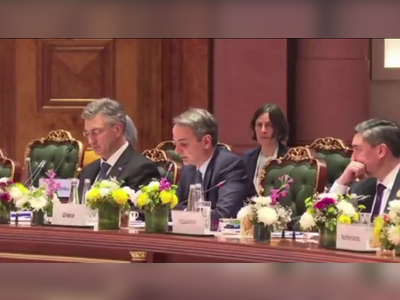Rachel Reeves Warned of Need to Raise Extra £9bn to Prevent UK Public Service Cuts
Economic Stability Concerns Rise Following Record Tax-Raising Budget
Rachel Reeves, the UK Chancellor, has been advised that an additional £9bn in tax increases may be necessary to avoid austerity measures affecting public services, despite her landmark tax-raising budget efforts.
The financial markets reacted with concern, causing a rise in government borrowing costs as traders scrutinized the budget's tax and spending proposals.
On Thursday, the yield on the UK's 10-year government bonds surged to its highest level this year, exceeding 4.5% before easing slightly.
This rise indicates an increase in the government's borrowing costs and has sparked fears among traders that the budget could hinder the Bank of England's plans for significant interest rate cuts.
Meanwhile, the pound experienced a drop to its lowest value against the US dollar in two months.
Despite the International Monetary Fund's support for the Labour-led budget, comparisons to Liz Truss's previous fiscal crisis surfaced, albeit with analysts noting the current situation as less severe.
Concerns were also raised about the timing of the budget, given its proximity to a tense US election and the unprecedented scale of the tax and spending package.
Jonas Goltermann of Capital Economics cautioned that while the situation is far from the 2022 'mini-budget' turmoil, investor anxiety about the UK's fiscal outlook persists.
The Bank of England and Treasury remain vigilant, while Reeves reassured investors via Bloomberg, emphasizing Labour's priority on economic and fiscal stability.
The political opposition, including Conservative politician Jeremy Hunt, criticized the market repercussions of Reeves’s budget, predicting more expensive mortgages and higher debt interest payments for taxpayers.
Much depends on whether the financial response is sustained; if so, mortgage costs could climb as the Bank of England hesitates to push interest rates below 4% next year.
Economists question the efficacy of Reeves’s £70bn spending plan, half funded by significant tax hikes, in stabilizing public finances and boosting economic growth.
Paul Johnson of the Institute for Fiscal Studies suggested that additional spending of £9bn might be essential to prevent real-term cuts in certain government sectors.
Critics argue that while Reeves aims for increased spending, higher taxes, and borrowing, these measures may not sufficiently enhance public services or living standards before the next election.
The Resolution Foundation highlighted the budget's potential impact on funding public services and its risks to household living standards due to the rise in employer national insurance dampening wage growth.
The UK government's spokesperson acknowledged hopes for improved growth forecasts throughout the parliament, contingent upon the implementation of further reforms.
Despite criticisms, the spokesperson defended the government’s spending trajectory, contrasting it with previous plans and emphasizing growth in public service funding.
The financial markets reacted with concern, causing a rise in government borrowing costs as traders scrutinized the budget's tax and spending proposals.
On Thursday, the yield on the UK's 10-year government bonds surged to its highest level this year, exceeding 4.5% before easing slightly.
This rise indicates an increase in the government's borrowing costs and has sparked fears among traders that the budget could hinder the Bank of England's plans for significant interest rate cuts.
Meanwhile, the pound experienced a drop to its lowest value against the US dollar in two months.
Despite the International Monetary Fund's support for the Labour-led budget, comparisons to Liz Truss's previous fiscal crisis surfaced, albeit with analysts noting the current situation as less severe.
Concerns were also raised about the timing of the budget, given its proximity to a tense US election and the unprecedented scale of the tax and spending package.
Jonas Goltermann of Capital Economics cautioned that while the situation is far from the 2022 'mini-budget' turmoil, investor anxiety about the UK's fiscal outlook persists.
The Bank of England and Treasury remain vigilant, while Reeves reassured investors via Bloomberg, emphasizing Labour's priority on economic and fiscal stability.
The political opposition, including Conservative politician Jeremy Hunt, criticized the market repercussions of Reeves’s budget, predicting more expensive mortgages and higher debt interest payments for taxpayers.
Much depends on whether the financial response is sustained; if so, mortgage costs could climb as the Bank of England hesitates to push interest rates below 4% next year.
Economists question the efficacy of Reeves’s £70bn spending plan, half funded by significant tax hikes, in stabilizing public finances and boosting economic growth.
Paul Johnson of the Institute for Fiscal Studies suggested that additional spending of £9bn might be essential to prevent real-term cuts in certain government sectors.
Critics argue that while Reeves aims for increased spending, higher taxes, and borrowing, these measures may not sufficiently enhance public services or living standards before the next election.
The Resolution Foundation highlighted the budget's potential impact on funding public services and its risks to household living standards due to the rise in employer national insurance dampening wage growth.
The UK government's spokesperson acknowledged hopes for improved growth forecasts throughout the parliament, contingent upon the implementation of further reforms.
Despite criticisms, the spokesperson defended the government’s spending trajectory, contrasting it with previous plans and emphasizing growth in public service funding.











